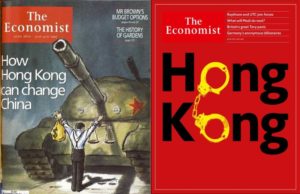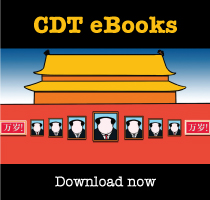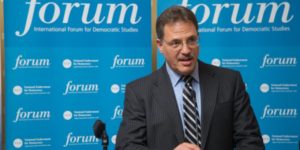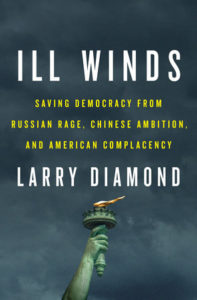China has deployed a three-pronged strategy to suffocate pro-democracy protests in Hong Kong — propaganda, economic leverage and intimidation, or media, money, and muscle. For instance, videos – including one of lines of armored personnel carriers backed by chest-thumping patriotic song – have been pumped around state media, AFP reports.
The videos aimed “to ratchet up the psychological warfare and serve as warning to the protesters that these troops… are very close to Hong Kong and they can be deployed anytime Beijing wants,” said political analyst Willy Lam of the Chinese University of Hong Kong.
 As protests continue to roil Hong Kong’s streets, China’s state-led propaganda machine has gone into overdrive to persuade the world that radical Hong Kong protesters have put the city in peril. Through social media and other digital arenas, English-language messages from China have painted a picture of a tiny minority of foreign-influenced ruffians intimidating a silent majority of law-and-order residents. But instead of making China’s case, Beijing’s ham-handed international efforts have largely failed to sway world public opinion, Li Yuan writes for The New York Times:
As protests continue to roil Hong Kong’s streets, China’s state-led propaganda machine has gone into overdrive to persuade the world that radical Hong Kong protesters have put the city in peril. Through social media and other digital arenas, English-language messages from China have painted a picture of a tiny minority of foreign-influenced ruffians intimidating a silent majority of law-and-order residents. But instead of making China’s case, Beijing’s ham-handed international efforts have largely failed to sway world public opinion, Li Yuan writes for The New York Times:
Under Xi Jinping, its top leader, China has come up with a wide range of initiatives to woo the world with its ideals and its wallet. The “China Dream” envisions a peaceful world in which China plays a leading role. Projects like the Belt and Road Initiative and the Asian Infrastructure Investment Bank are intended to show the benefits of China’s growing wealth. …However, the Hong Kong protests have suggested that Beijing still knows hard power much better than soft. Instead of offering a competing narrative of a Hong Kong that could prosper under Chinese rule, it has instead made itself look like a bully.
 In its latest effort to reshape the global narrative over Hong Kong, in a letter sent to senior editors at international media outlets including the Wall Street Journal, Reuters, and Agence France-Presse, the Chinese Foreign Ministry alleges foreign interference and details meetings of activists across the world in venues including the Oslo Freedom Forum, Bloomberg reports. It also cites media reports on meetings between U.S. consulate officials and Hong Kong opposition leaders, and links the U.S. National Endowment for Democracy to Hong Kong activists.
In its latest effort to reshape the global narrative over Hong Kong, in a letter sent to senior editors at international media outlets including the Wall Street Journal, Reuters, and Agence France-Presse, the Chinese Foreign Ministry alleges foreign interference and details meetings of activists across the world in venues including the Oslo Freedom Forum, Bloomberg reports. It also cites media reports on meetings between U.S. consulate officials and Hong Kong opposition leaders, and links the U.S. National Endowment for Democracy to Hong Kong activists.
“China is copying Russia and has set up a large number of accounts on Facebook and Twitter to pump out anti-protester propaganda filled with factually untrue statements and pictures. [Such accounts are] an attempt to polarise opinion, which Twitter and Facebook have publicly stated they don’t want to do, so they are acting on their new policies,” said Victor Shih, a professor at the University of California, San Diego’s School of Global Policy and Strategy.
He noted that the platforms had tightened regulations following “blowback” after the 2016 poll, POLITICO reports. “They increased the level and awareness and [changed] the algorithm that they are using to catch manufactured campaigns for a political end, especially a violent political end,” Shih added.
Should it continue down the same rhetorical path, China risks eroding what little soft power it has, The Times’s Li adds. As Harvard’s Joseph Nye once explained to Chinese university students, “the best propaganda is not propaganda,” because during the Information Age, “credibility is the scarcest resource.”
 China Digital Times exposes thew regime’s censorship instructions, issued to the media by government authorities, that have been leaked and distributed online.
China Digital Times exposes thew regime’s censorship instructions, issued to the media by government authorities, that have been leaked and distributed online.
The U.S. administration should continue to speak out forcefully in support of Hong Kong’s freedom’s demonstrators—and endorse the bipartisan Hong Kong Human Rights and Democracy Act, which provides for targeted sanctions against officials who suppress basic freedoms in Hong Kong,” argues Larry Diamond, a senior fellow at Stanford University’s Hoover Institution and Freeman Spogli Institute for International Studies.
It would be the right thing to do. It would help to stem the ill winds blowing globally. But most of all, it could deter authorities in Hong Kong and Beijing from a tragic turn to force instead of negotiations. And it might also renew the hope of beleaguered democrats in Hong Kong, and thus their ability to bring leadership and organization to a movement that is sorely in need of it, he writes for The Hill.
 “At the same time, we have a responsibility to the people of Hong Kong not to mislead them or to encourage radical postures that will be self-defeating,” Diamond told the Northern California Hong Kong Club (above).
“At the same time, we have a responsibility to the people of Hong Kong not to mislead them or to encourage radical postures that will be self-defeating,” Diamond told the Northern California Hong Kong Club (above).
Under the agreement that returned Hong Kong to China, Hong Kong is a part of the PRC. It is one thing to demand autonomy, and the right that was promised to democratic elections, he said. But it’s another thing to talk of separatism or Hong Kong independence. That will only end in tragedy for Hong Kong.
My advice to the Hong Kong democracy movement is the catchphrase of the civil rights movement in America: “Eyes on the prize,” and that is democracy in HK, said Diamond, author of Ill Winds: Saving Democracy From Russian Rage, Chinese Ambition, and American Complacency and co-director of the National Endowment for Democracy’s International Forum for Democratic Studies.
Kleptocrats stand to lose
 Much of the news commentary on the protests depicts a David vs. Goliath standoff in which Hong Kong can only lose, notes Andrea Binder, a nonresident fellow at the Global Public Policy Institute in Berlin.
Much of the news commentary on the protests depicts a David vs. Goliath standoff in which Hong Kong can only lose, notes Andrea Binder, a nonresident fellow at the Global Public Policy Institute in Berlin.
Yet this view overlooks an important aspect of the power relationship between Hong Kong and China: private money. Rich Chinese mainlanders — many of whom are intimately connected to the ruling Communist Party — stand to lose a lot of money if Hong Kong descends into chaos. My research on offshore finance and state power helps explain why, he writes for The Post’s Monkey Cage blog:
This doesn’t include other money that goes unreported because it’s dirty — for instance, the proceeds from corruption. The 2016 Panama Papers leak revealed that some of China’s politically and economically influential families owned offshore structures. Mossack Fonseca, the law firm at the core of the scandal, set up more than 16,300 shell companies for these individuals in Hong Kong alone.
A violent crackdown on Hong Kong and the ensuing collapse of the delicate balance between independence and control would damage their own prosperity, adds Binder. RTWT







